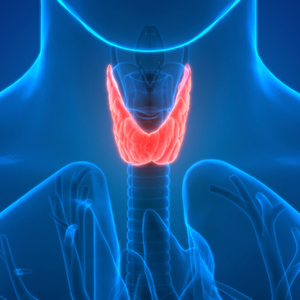Thyroid dysfunction following treatment with immune checkpoint inhibitors is more common than previously thought, according to research that was accepted for presentation at ENDO 2020, the Endocrine Society’s annual meeting (Abstract SAT-418), and that will be published in Journal of the Endocrine Society.

Photo credit: Getty
Cancer immunotherapy—particularly treatment with immune checkpoint inhibitors—has become a key part of treating some types of cancer and can offer some patients sustained remissions. Immune checkpoint inhibitors are approved to treat some patients with a variety of malignancies, including breast, bladder, cervical, colon, head and neck, liver, lung, skin, stomach, and rectal cancers.
Along with the benefits of these treatments, possible side effects include immune-related adverse events, when the immune system attacks normal, noncancerous cells. One of the more common—albeit mild—side effects is abnormal thyroid levels, particularly hypothyroidism.
“It was unclear to what extent [hypothyroidism] occurred outside the clinical trial setting…so we used information from electronic health records to determine how common it was in practice,” said lead researcher Zoe Quandt, MD, of the University of California, San Francisco. “Understanding who gets these immune-related adverse events, why they get them, and what impact they have on response to therapy is an essential part of optimizing our use of immune checkpoint inhibitors.”
Methodology
The researchers analyzed electronic health record data from the University of California, San Francisco on every patient who had received immune checkpoint inhibitors for treatment of cancer between 2012 and 2018. They excluded anyone with thyroid cancer (whether or not that was the indication for the immune checkpoint inhibitor) or preexisting thyroid disease. For the remaining 1,146 patients, they looked for those who had some type of thyroid dysfunction—either abnormal levels of thyroid hormones or a prescription for thyroid medication. Melanoma was the most common cancer treated (32%), followed by non–small cell lung cancer (13%). Pembrolizumab was the most common immune checkpoint inhibitor used (in 45% of patients), followed by nivolumab (in 20%).
Results
Overall, 19% of subjects exposed to immune checkpoint inhibitors from the dataset developed thyroid dysfunction. In contrast, a review of clinical trials found a much lower rate—6.6% of immune checkpoint inhibitor patients developed hypothyroidism, and 2.9% had hyperthyroidism.
After adjustment for gender and age, the type of cancer was significantly associated with new-onset thyroid dysfunction (P = .01). The rate of thyroid dysfunction ranged from 10% of patients with the glioblastoma to 40% in those with renal cell carcinoma. While there was no significant association between thyroid dysfunction and specific immune checkpoint inhibitors, thyroid dysfunction was more common in patients who received a combination of nivolumab and ipilimumab (31%) compared with either pembrolizumab (18%), nivolumab (18%) or ipilimumab (15%) alone.
The authors concluded, “Thyroid immune-related adverse events are much more common in real-world practice than in clinical trials and there is emerging evidence that certain cancer types incur a higher risk of thyroid immune-related adverse events even after adjustment for checkpoint inhibitor exposure. Clinicians and patients should be educated about these risks. Future work should focus on exploring the reasons underlying the differing rates of thyroid immune-related adverse events among different cancers, including effect on cancer outcomes.”

